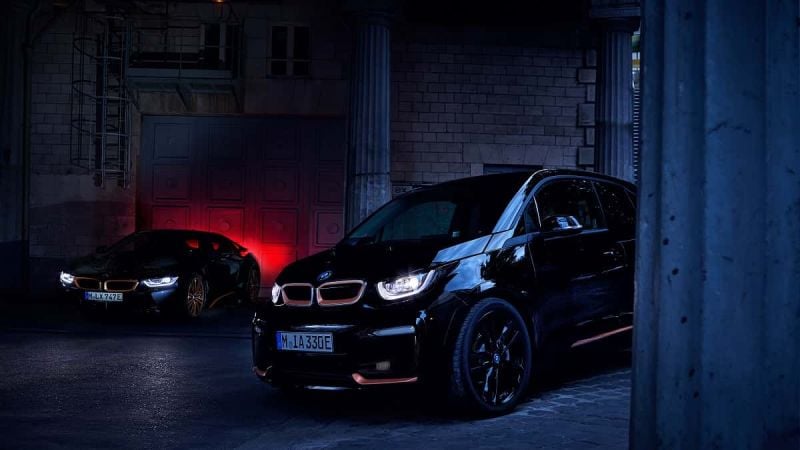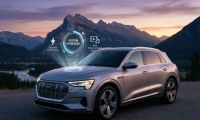The speculation is over. BMW will sunset the i3 electric vehicle line after this generation. This according to Pieter Nota, BMW’s sales and marketing chief who spoke to the Financial Times. “There’s no specific plan for an i3 successor. We are now bringing electrification more to the mainstream.”
Like every battery-electric vehicle sold in America, sales of the BMW i3 are down significantly over the past few months. The i3 has seen both versions of its EV drop well below 1,000 units per month. In fact, BMW has had trouble breaking 400 units sold per month in America for a year now. The last month that BMW sold over 1,000 i3 in the U.S. was August of 2016. As far as our research can find, the i3 never broke 1,500 units in any month of sales in the U.S. market. It was introduced in May of 2014.
The i3 was BMW's push to make an EV that could serve a broad audience. Though not priced for affordable vehicle shoppers, it was one of BMW's lower-priced vehicles. Available in two versions, a battery-electric and also a range-extended model, the i3 seemed to have a good formula - at first. However, BMW never had anywhere near mainstream sales with its i3.
The i3 was also a comprehensive effort by BMW, not a conversion of another vehicle. BMW had done those prior to its i3. BMW started with a fresh sheet of paper. The chassis incorporated state of the art composites and BMW even built new global facilities in which to make the i3's modern components. Some placed strategically near hydropower so that the i3's construction would have a low carbon footprint.
Attempting to put a positive spin on the i3, Mr. Nota told FT, "The i3 is actually doing extremely well in its sixth year of production already.” This is almost sad to have to report. BMW sold just 385 in August and 304 in July in the U.S. If that is a green model that is selling quite well, count BMW out of the EV race. For those not familiar with EV sales numbers, Tesla sold about 13,000 Model 3s in each of the past couple of months and Toyota sold over 2,500 Prius Primes in each of the past two months.
John Goreham is a life-long car nut and recovering engineer. Presently at Torque News he has a focus on Toyota, Lexus, Ford Midsized Trucks, Tesla and Mazda. In the early 1990s he was part of a team that built a solar-electric race car from scratch. For 20 years he applied his engineering and sales talents in the high tech world and published numerous articles in technical journals such as Chemical Processing Magazine. In 2008 he retired from that career and dedicated himself to chasing his dream of being an auto writer. You can follow John on John Goreham Twitter, Facebook and Linkedin.
Set Torque News as Preferred Source on Google












Comments
I think BMW is making the
Permalink
I think BMW is making the right move John. i3 has never been as popular as Nissan Leaf or Teslas. Perhaps BMW couldn't succeed in creating a story around it. If it had a greater range then it would be a different story. I wish they can replace it with more advanced and long-range electric vehicles. A several days ago I saw a documentary by DW in which the German Automotive executives were considering the EV future and they understand they need to hurry up.
I have never been a fan of
Permalink
I have never been a fan of the i3 because of it's weird styling. It was as awkward looking as the impressive i8 was beautiful. But I will give credit to BMW for engineering the heck out of the car, with a carbon fiber frame and the door pillar built into the suicide rear doors for easy rear access. But like almost every one of the early BEV designs, their relatively short (originally 72mi+/later 114mi) EV only range limits usability compared to similarly priced newer BEVs with double the range. Plus the range extender was designed to meet older compliance restrictions, and so it only produces 34HP and you cannot just drive the car on the gas engine alone like you can in the Volt, ELR, Prius, and Clarity PHEVs. In fact BMW has several lawsuits from owners who found it unsafe when their i3 went into limp mode without warning on the freeway, immediately dropping down to 45MPH. And even though (like VW's EV Golf and Nissan Leaf) the EV range went up from early models, it was still relatively low. And with the range extender an i3 was approaching $50K and together with the battery it only managed 200 miles, as opposed to the similarly priced Tesla Model 3 Long Range which gets around 310 EV miles. Ultimately most automakers are abandoning small EV cars for more profitable EV CUVs and luxury models, so it makes sense that BMW would simply transfer their EV technology to their larger line of CUVs and SUVs. As much as I want to see more fun EV sportscars, this move makes good business sense considering today's bigger vehicle market climate. I think that time will view the BMW i3 as an interesting (early) BEV engineering exercise, that set the stage for better future BEVs.